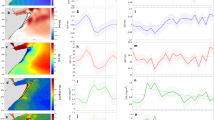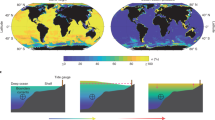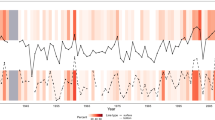Abstract
THE historical record of maritime observations are summarised here to indicate the dominant seasonal variations in upwelling, and in certain associated processes, within the Guinea Current region. The region is similar to other eastern ocean boundary upwelling areas in the appearance of cool sea temperatures near the coast, productive coastal fisheries, and a zone of low rainfall on the adjacent coast (Fig. 1). It differs from some of the more studied regions in several important respects. These include the zonal rather than meridional trend of the coast, the influence of a rather narrow intense coastwise current, and an unusual lack of correspondence on the seasonal time scale between sea-temperature features attributable to upwelling, and features in the overlying wind stress field1. There seems to be a link between interyear variations in upwelling intensity and corresponding variations in both coastal rainfall and local fishery success.
This is a preview of subscription content, access via your institution
Access options
Subscribe to this journal
Receive 51 print issues and online access
$199.00 per year
only $3.90 per issue
Buy this article
- Purchase on Springer Link
- Instant access to full article PDF
Prices may be subject to local taxes which are calculated during checkout
Similar content being viewed by others
References
Longhurst, A. R. Bull. Inst. fr. Afr. noire 24, 633–633 (1962).
Berrit, G. R. Cah. Oceanogr. 14, 719–729 (1962).
Wooster, W. S., Bakun, A. & McLain, D. R. J. mar. Res. 34, 131–141, (1976).
Bohnecke, G. Meteor 1925-1927, 5, 1–186 (1936).
Cushing, D. H. FAO Fish. Tech. Pap. 84, (1969).
Bakun, A., McLain, D. R. & Mayo, F. V. Fish Bull, U.S. 72, 843–844 (1974).
Hsueh, Y. & O'Brien, J. J. J. phys. Oceanogr. 1, 180–186, (1971).
Stommel, H. & Wooster, W. S. Proc. natn. Acad. Sci. U.S.A. 54, 8–13 (1965).
Arthur, R. R. J. geophys. Res. 70, 2799–2803 (1965).
Ingham, M. C. Bull. mar. Sci. 20, 1–34 (1970).
Gill, A. E. & Clarke, A. J. Deep-sea Res. 21, 325–345 (1974).
Allen, J. S. J. phys. Oceanogr. 5, 300–325 (1975).
Verstraete, J. M. Doc. Scient. Centre Tech. Oceanogr. Abidjan, 1, 13–35 (1970).
Trewartha, G. T. An Introduction to Climate (McGraw-Hill, New York, 1968).
Trewartha, G. T. The Earth's Problem Climates, (University Wisconsin Press, Madison, 1961).
Steigner, J. M. & Ingham, M. C. NOAA Tech. Rep. NMFS SSRF-643. (US Dep. Commer., Seattle, 1971).
Monthly Climatic Data for the World 16 through 21 (US Dep. Commer., Asheville, N. C., July 1963 through Oct. 1968).
Yearbook of Fishery Statistics 26, (Food and Agriculture Organization of the United Nations, 1969).
Di Palma, S. Foreign Fisheries Leaflet no. 77 (US Dep. Interior, Washington, D. C., 1968).
Author information
Authors and Affiliations
Rights and permissions
About this article
Cite this article
BAKUN, A. Guinea Current upwelling. Nature 271, 147–150 (1978). https://doi.org/10.1038/271147a0
Received:
Accepted:
Issue Date:
DOI: https://doi.org/10.1038/271147a0
This article is cited by
-
Lophelia reefs off North and West Africa–Comparing environment and health
Marine Biology (2024)
-
Influence of Wind and Surface Buoyancy Flux on the Variability of the Oceanic Mixed Layer Depth in the Northern Gulf of Guinea Coastal Upwelling
Thalassas: An International Journal of Marine Sciences (2022)
-
Seasonal Variability of Sea Surface Salinity in the NW Gulf of Guinea from SMAP Satellite
Remote Sensing in Earth Systems Sciences (2022)
-
Enhancing Satellite Oceanography-Driven Research in West Africa: a Case Study of Capacity Development in an Underserved Region
Remote Sensing in Earth Systems Sciences (2022)
-
Paleoenvironment and taphonomy of lower Miocene bivalve and macroid assemblages: the Lagos Biocalcarenite (Lagos-Portimão Formation, southern Portugal)
Facies (2019)
Comments
By submitting a comment you agree to abide by our Terms and Community Guidelines. If you find something abusive or that does not comply with our terms or guidelines please flag it as inappropriate.



